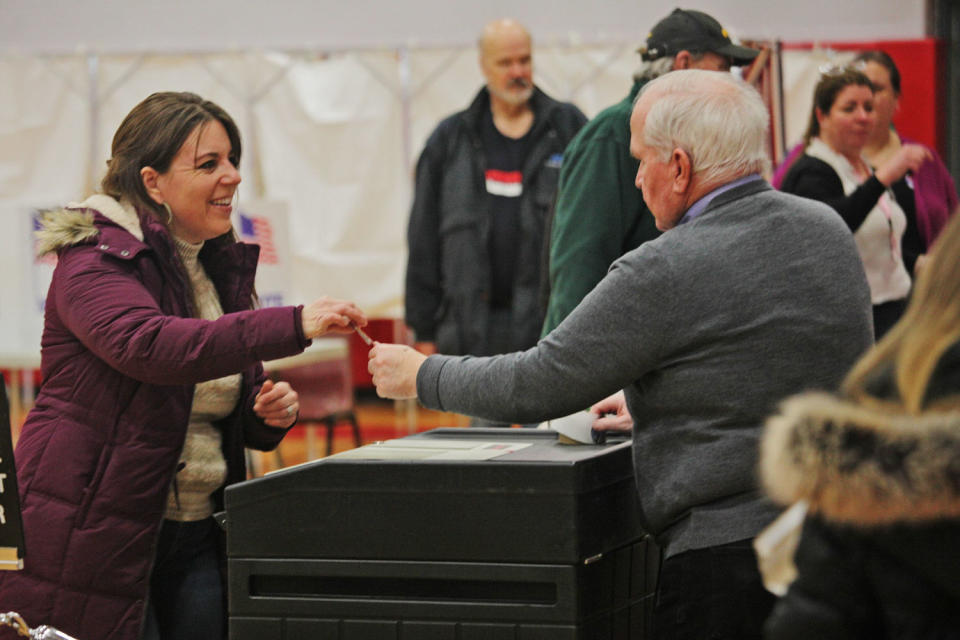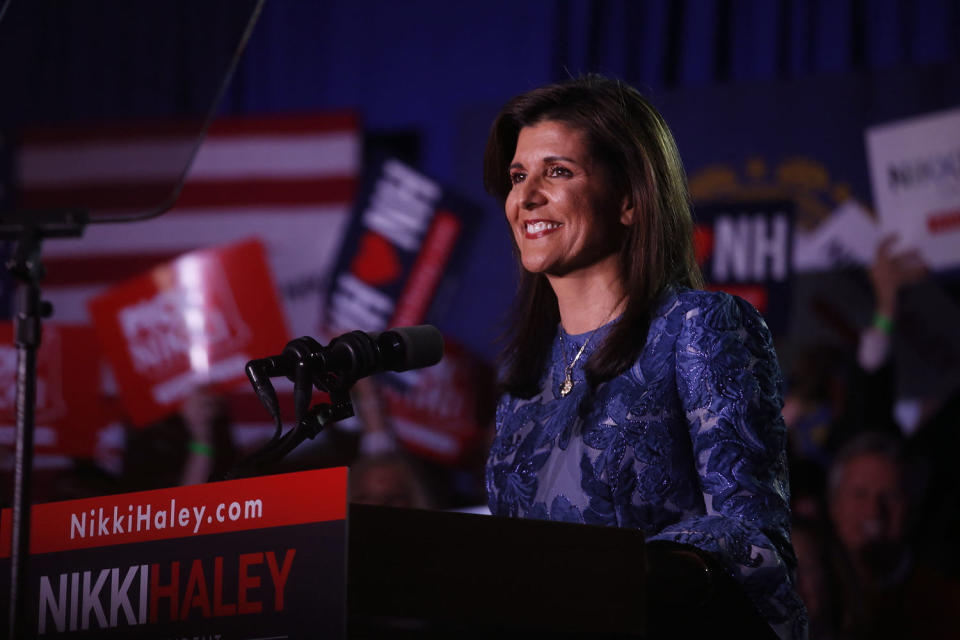Trump wins the New Hampshire Republican primary, as Nikki Haley vows to fight on
- Oops!Something went wrong.Please try again later.
- Oops!Something went wrong.Please try again later.
- Oops!Something went wrong.Please try again later.
- Oops!Something went wrong.Please try again later.
MANCHESTER, N.H. — Former President Donald Trump leapt closer to the Republican presidential nomination Tuesday, defeating his lone remaining rival, former U.N. Ambassador Nikki Haley, in New Hampshire’s primary, NBC News projects.
In doing so, he put one of the final pieces in place for a long-anticipated rematch with President Joe Biden in November.
The victory made the former president the first non-incumbent to win both the Iowa caucuses and the New Hampshire primary. No Republican has won both and failed to take the party’s nomination.
“The beginning was the end,” said Republican strategist Matthew Bartlett, a New Hampshire native. “New Hampshire was the only place that could have been a wild card, and Trump drew an ace.”
Follow live New Hampshire updates here.
But Haley vowed to press on.
"New Hampshire is first in the nation. It is not the last in the nation," she said at an election night party in Concord. "This race is far from over."
In her remarks, Haley pressed the case that Trump has been a disaster for Republicans up and down the ballot in recent elections and that he will be again if he carries the GOP banner in November.
"The worst-kept secret in politics is how badly the Democrats want to run against Donald Trump," Haley said. "A Trump nomination is a Biden win and a [Vice President] Kamala Harris presidency."
She also renewed her challenge for Trump to debate her.
Trump, speaking from Nashua, mocked Haley as an "impostor" for having "pretended" to win as results came in. He also suggested Haley should drop out to unify the GOP.
"We have to do what's good for our party," he said, implying it was time for her to back him. "And she was up and she's doing a speech like she won. She didn't win. She lost."
With 36% of the expected vote counted, Trump led Haley 55% to 43%.
Earlier in the night, Trump had taken umbrage at Haley's remarks while she was delivering them, posting on the Truth Social media platform that Haley is "DELUSIONAL!!!" as she spoke. "SHE JUST LOST NEVADA, WHICH IS UP NEXT!" he wrote in another post.
Trump is certain to win the Feb. 8 Nevada caucuses — which Haley will not participate in — before the race turns to her home state of South Carolina, where she was twice elected governor but trails the former president by dozens of points in public polling.
"It’s time for unity, it’s time to take the fight to the Democrats, and for Nikki Haley: it’s time to drop out," said Taylor Budowich, CEO of Maga America Great Inc., a political action committee backing Trump.
Trump headed into Tuesday's voting, which began at midnight in Dixville Notch, with a lead that had gradually expanded in a Suffolk University/Boston Globe/NBC-Boston tracking poll during a week in which the third major competitor, Florida Gov. Ron DeSantis, dropped out of the race and endorsed Trump.
"If President Trump comes out strong tonight, that's a clear message being sent by our primary voters," Republican National Committee Chair Ronna McDaniel said in a statement to NBC News before the results came in. "Another message we're hearing is unity — from President Trump, Gov. DeSantis and Sen. [Tim] Scott [R-S.C.]. Republicans know that if we're not united as a party behind our nominee we won't be able to beat Biden."
McDaniel noted that there has never been "a Republican nominee who did not win at least Iowa or New Hampshire."

On the Democratic side, Biden chose not to file for the ballot, a decision consistent with his successful request that the Democratic National Committee tap South Carolina as the first state to count in his party's nomination process. He won New Hampshire as a write-in candidate against Rep. Dean Phillips, D-Minn., and self-help author Marianne Williamson.
But with Biden all but assured of coasting to the Democratic nomination, the real action was on the Republican side.
Though Haley swept all six votes Tuesday morning in Dixville Notch — a small hamlet closer to Montreal than Manchester — Trump led her 60% to 38% in the final iteration of the Suffolk University/Boston Globe/NBC Boston survey, a spread that had grown by 6 percentage points in one week.
Haley insists that she can beat Trump in the one-on-one fight she now has on her hands — arguing that America is ready for a generational change from him and Biden — and her campaign promised early Tuesday that the battle would continue past New Hampshire no matter the outcome in the second state to vote.
Pre-election surveys showed Trump dominating Haley among registered Republicans in New Hampshire, with Haley boasting a smaller edge among the state's sizable population of independent voters, who are allowed to choose a Republican ballot on primary day.
Among the 49% of voters who identified themselves as Republicans, Trump won 74% to 25%, according to NBC News exit polling. Haley won self-identified independents, who accounted for 45% of the electorate, 61% to 37%. Six percent of voters said they consider themselves Democrats. Among that group, Haley won 84% to 6%.
Those splits underscore Haley's challenge in competing for the Republican nomination: She does far better with independents and Democrats than with Republicans.
Part of Haley’s argument is that many of the states, including 11 of the 16 that vote on Super Tuesday, March 5, have primaries that allow independents to vote in GOP primaries.
"After Super Tuesday, we will have a very good picture of where this race stands. At that point, millions of Americans in 26 states and territories will have voted," Haley campaign manager Betsy Ankeny wrote in a memo. "Until then, everyone should take a deep breath."
In an area of major contrast between the candidates — one of whom served as president and the other as his ambassador to the United Nations — voters who said the U.S. role in foreign policy is about right backed Haley 77% to 19%, according to the NBC News exit polling. But they accounted for just 23% of the electorate. Those who want the U.S. to be more active around the globe and those who want the U.S. to be less active supported Trump by wide margins.
Haley won college-educated voters, 58% to 39%. Trump won voters who did not graduate from college, 66% to 32%. Haley won voters whose family incomes met or exceeded $100,000 per year, while Trump was favored by voters whose families earn less.
Closing pitches
Trump spent the past week lobbying New Hampshire voters with one-a-day events across the state and at least one weekend tele-rally. His surrogates, including members of Congress and former rivals, fanned out to reach more voters in person and appeared on television and radio broadcasts.
In his final pitch to voters, in a cramped basement in Laconia on Monday night, Trump implied that an impressive margin in New Hampshire would set the stage for the general election.
"Get out of bed and just get to vote. Grab your neighbor, grab everybody. You gotta you, gotta go out, because we have to win by big margins," he said. "And the reason we have to do that [is] very simple. You know what the reason is: In November, we have to send the signal that we’re not playing games."
He consistently hit Haley for wanting to raise the retirement age for Social Security and portrayed her as weak on border security.
After Republicans in the state complained that Haley had canceled debates, stopped taking audience questions at her events and booked a light schedule early in the week — her campaign explained that she had left New Hampshire for a weekly visit to her parents in South Carolina — she barnstormed like a candidate on a mission.

At a get-out-the-vote event in Salem on Monday, Haley told voters they are at a generational fork.
"This really is an option," she said. "Do you want more of the same? Or do you want to go forward? ... Seventy percent of Americans have said they don’t want a Trump-Biden rematch. The majority of Americans disapprove of both Biden and Trump."
She was able to secure the endorsement of New Hampshire Gov. Chris Sununu, who appeared in television ads for her. They both asserted that she would give Republicans a better chance of winning up and down the ballot in November, with Haley frequently pointing to surveys that show her faring better against Biden than Trump does.
The biggest little moment
With Trump refusing to debate anyone and Haley declining to debate DeSantis last week if Trump didn't participate, voters here were left without the chance to watch the candidates face off in person.
So it was DeSantis' abrupt decision to suspend his campaign Sunday that amounted to the biggest potential game changer in the eight-day stretch between the Iowa caucuses and Tuesday's primary.
For months, Haley and DeSantis had battled to a relative draw in their competition to become the lone serious challenger to Trump. By the time they reached New Hampshire, the rest of the candidates had dropped out. North Dakota Gov. Doug Burgum, businessman Vivek Ramaswamy and Scott, who had previously exited the race, all campaigned for Trump.
After trying to convince his supporters that he could remain viable despite single-digit polling in New Hampshire — in part by visiting South Carolina repeatedly during the week — DeSantis traveled home to Florida and canceled all Sunday morning television appearances.
Instead, he met with advisers, including Rep. Chip Roy, R-Texas, at the Governor's Mansion in Tallahassee to assess his options. With his wife, Casey, he decided to end his bid, announcing his decision later in the day in a video in which he also endorsed Trump.
But his departure appeared to have little effect, given the small pool of voters who backed him.
This article was originally published on NBCNews.com

